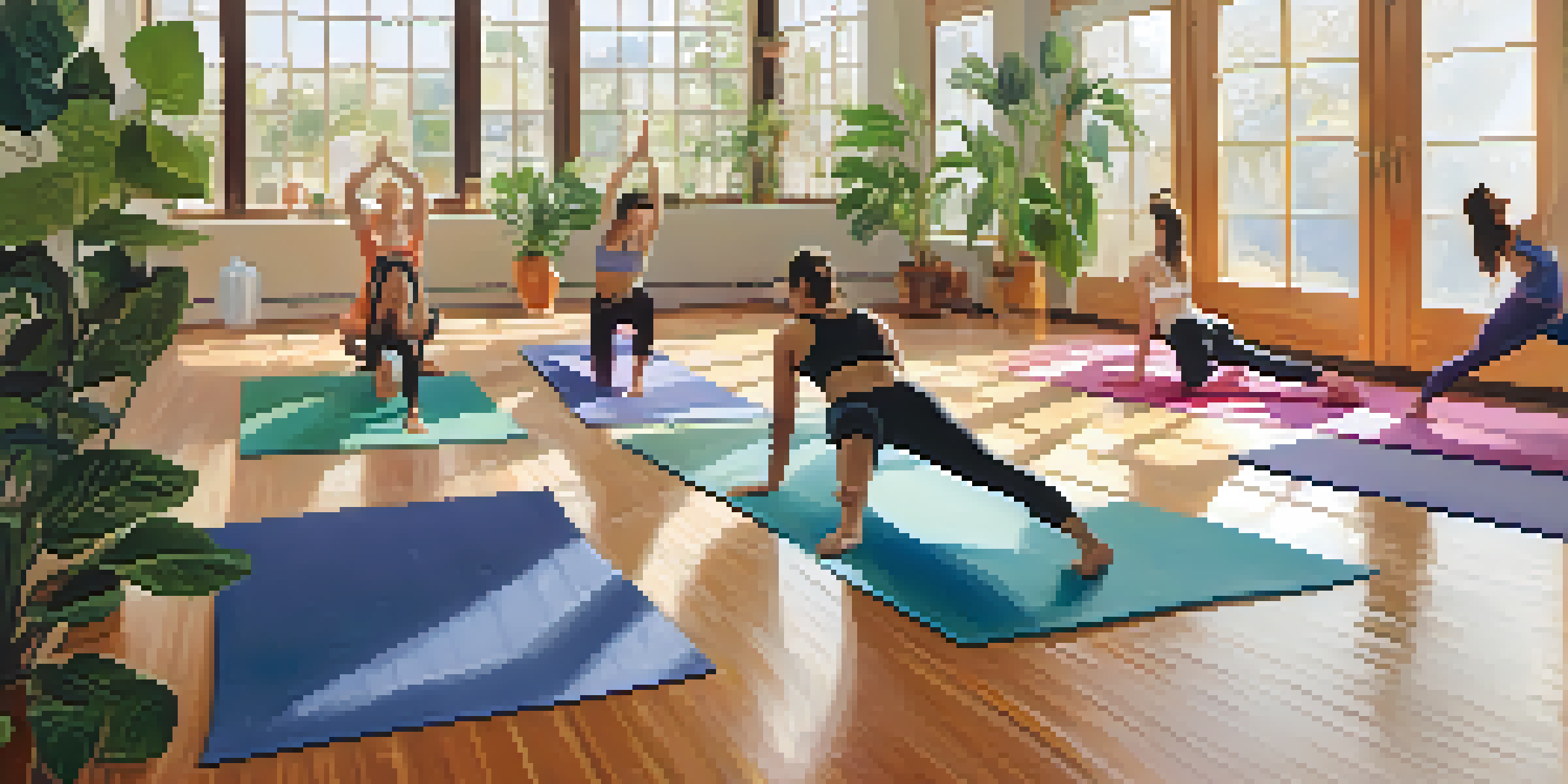Yoga for Athletes: Enhancing Performance and Recovery

Understanding Yoga's Role in Athletic Performance
Yoga isn’t just about relaxation; it's a powerful tool for athletes. It combines physical postures, breath control, and meditation, all of which can enhance strength, flexibility, and mental focus. These elements are crucial for athletes who need to perform at their peak during competitions.
Yoga is not just a workout; it's a work-in. It's about the balance of strength and flexibility, both in mind and body.
For instance, practices like Vinyasa or Power Yoga can improve cardiovascular endurance and core strength, making them excellent complements to traditional training. Imagine running a marathon and finding that your breathing is steadier and your muscles are more resilient, thanks to yoga.
Ultimately, incorporating yoga into an athlete's routine can lead to better performance, allowing them to push their limits while maintaining a sense of balance and calm.
Enhancing Flexibility Through Yoga Practice
Flexibility is often a game-changer in sports, and yoga is renowned for improving it. Through various poses, yoga stretches and strengthens muscles, which can prevent injuries and enhance overall mobility. Think of it like oiling a squeaky hinge; flexibility keeps everything moving smoothly.

For example, athletes in sports like soccer or gymnastics benefit immensely from greater flexibility, as it allows for a wider range of motion and more fluid movements. A well-stretched muscle can absorb shocks better, making a player less prone to strains.
Yoga Boosts Athletic Performance
Incorporating yoga enhances strength, flexibility, and mental focus, essential for peak athletic performance.
By regularly practicing yoga, athletes can achieve a balance between strength and flexibility, making them more agile and efficient in their movements.
Improving Focus and Mental Clarity with Yoga
Yoga encourages mindfulness through breath control and meditation, which can significantly enhance an athlete's focus. This mental clarity helps athletes stay present during competitions, reducing anxiety and improving decision-making on the field or court. Imagine being able to tune out distractions and zero in on your performance.
The body benefits from movement, and the mind benefits from stillness.
Additionally, the practice of visualization in yoga can help athletes mentally prepare for events. By picturing themselves succeeding, athletes can build confidence and mental resilience, setting them up for success.
In essence, yoga serves as a mental training ground, where athletes can cultivate the focus needed to excel in their respective sports.
Yoga as a Tool for Injury Prevention
Injuries can sideline even the best athletes, but yoga can help mitigate this risk. By promoting better alignment and balance, yoga strengthens the muscles around joints, improving overall body mechanics. Think of it as a safety net that catches you before you fall.
For instance, athletes who practice yoga regularly often report fewer injuries compared to those who don’t. This is because yoga enhances body awareness, allowing athletes to recognize their limits and avoid overexertion.
Flexibility Reduces Injury Risk
Regular yoga practice improves flexibility, which helps prevent injuries and enhances overall mobility in athletes.
With a consistent yoga practice, athletes not only protect themselves from injuries but also boost their confidence in their abilities.
The Role of Breathing Techniques in Performance
Breath control is a fundamental aspect of yoga and plays a vital role in athletic performance. Techniques like Pranayama help athletes learn to regulate their breath, which can lead to improved stamina and endurance. Consider how a calm breath can fuel a long-distance runner, helping them maintain energy levels.
Moreover, proper breathing techniques can aid in recovery. After an intense workout, focusing on deep, controlled breaths can lower heart rates and promote quicker recovery. It's like giving your body a gentle reset.
By integrating these breathing techniques into their training, athletes can enhance both their performance and recovery times.
Yoga for Recovery: A Post-Workout Essential
After a strenuous workout, recovery is crucial, and yoga can provide a soothing antidote. Gentle yoga stretches facilitate muscle recovery by increasing blood flow and reducing soreness. Imagine a refreshing cool-down that leaves you feeling revitalized instead of fatigued.
Practicing restorative yoga poses can also help athletes unwind both physically and mentally. This relaxation reduces stress levels, which can hinder recovery. It’s like giving your body a mini-vacation after hard work.
Breath Control Aids Recovery
Yoga's breathing techniques improve stamina and promote faster recovery after intense workouts, benefiting athletic performance.
Incorporating yoga into post-workout routines can lead to more effective recovery, allowing athletes to bounce back stronger and ready for their next challenge.
Creating a Yoga Routine for Athletes
Developing a yoga routine tailored for athletes can be straightforward and highly rewarding. Start with a mix of strength-building poses, flexibility-enhancing stretches, and mindfulness practices. Think of it as crafting a balanced meal: each component plays a vital role in your overall well-being.
For optimal benefits, athletes should aim for a few sessions a week, gradually increasing intensity and duration. Incorporating poses like Downward Dog, Warrior II, and Pigeon can target specific muscle groups and enhance performance.

Ultimately, finding the right routine will vary for each athlete, but the key is consistency and mindfulness. This personalized approach ensures that yoga complements their unique training goals.